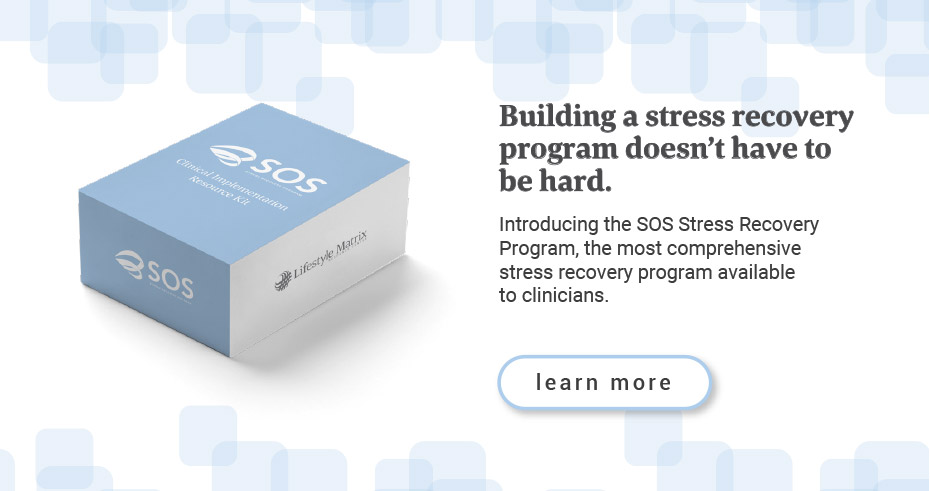It’s perfectly normal to experience some degree of anxiety before delivering a presentation, or something equally stressful. According to a 2018 survey conducted by the American Psychiatric Association (APA), 68% of people felt a combination of “extremely to somewhat anxious” most of the time.1
We are finally breaking through the mental health stigma and understanding that performance anxiety is not all in our patients’ heads. Everyone has different reasons for perceived stress, but it comes down to the body’s physiological needs when preparing for the event at hand. As we navigate the physical and psychological experience of stress, we’ll discuss the traditional and functional medicine approaches to performance anxiety at work, and share lifestyle and nutrient solutions to help our patients overcome it.
Physical and Psychological Experience of Performance Anxiety
We’ve all experienced the effects of the rush of adrenaline and cortisol just before a stressful event at work, which for many people, involves delivering a presentation. Whether an event like this excites us or triggers anxiety, the release of chemicals in the brain is the same. These “butterflies” usually disappear quickly once the activity begins. The body ramps up the sympathetic nervous system simultaneously to assist with the perceived fear or danger that the brain is experiencing. Our heart and breathing rate increases, palms become sweaty and clammy, and we feel on high alert. We will then experience a cognitive boost of concentration and focus, and the voice-quivering panic and other emotional discomfort subsides.
This brings us to the beneficial aspect of performance anxiety, in which we harness that jolt of chemicals into powerful perfection as our brain navigates through the rehearsed pathway with chemicals that enhance focus and energy. Adrenaline and cortisol are both stimulatory and responsible for improving focus and memory. Of course, long-term or repeated bouts of stress cause an abundance of these chemicals that add to anxiety and can lead to gastrointestinal problems, disruption of sleep and suppression of the immune system.
Traditional Approach to Performance Anxiety
Traditional treatment for performance anxiety tends to be reactive rather than proactive. For anxiety in general, prescriptions typically include benzodiazepines or selective serotonin reuptake inhibitor (SSRI) medications. Interestingly, I’ve treated some high-powered business executives whose jobs required frequent public speaking and they were given a class of drugs called beta-blockers. This medication was discovered by a Scottish pharmacologist, James Black, in the 1960s as a treatment for heart disease, but is now being touted in an “as needed” approach to reduce jitteriness and calm nervous energy for performance. Other tactics may include cognitive behavioral therapy (CBT). This therapy is very effective for anxiety disorders and can be used to identify problematic thought patterns and develop effective ways to cope and change stress perception.
Functional Medicine Approach to Performance Anxiety
No matter how often performance anxiety happens at work, the seemingly debilitating negativity can be turned into positive energy with the right lifestyle choices and nutrient solutions. In addition to CBT, talk therapy may be used to help patients overcome these performance challenges. Other coping mechanisms involve pre-performance rituals, such as breathing techniques and/or visualization. A relatively new but effective tactic called emotional freedom technique (EFT) can be helpful to calm and promote focus. This form of therapy can be performed by tapping or applying pressure to stimulate acupressure points. A common concept is to calm your nervous energy by rubbing points while focusing on thoughts that represent a certain trauma. This is thought to release the blockage by thinking about something positive once the fear has been pinpointed.
Along with the obvious recommendations to avoid anxiety stimulating caffeine or high sugar intake, excessive alcohol consumption should also be avoided. These vices are commonly known drivers of anxiety and can make the situation worse.
With that said, neurotransmitter depletion from too much stress or from nutrient deficiency can also allow anxiety to creep up on our patients. If they lack the proper inhibitory control to keep the sympathetic nervous system and adrenaline in balance, then no amount of “mind over matter” can help.
The primary inhibitory neurotransmitter is gamma-aminobutyric acid (GABA). This neurotransmitter is released in response to its stimulatory counterparts and helps bring us back to homeostasis after a stressful event. I like to think about this like balancing a teetertotter, or the concept of Newton’s third law, that every action has an opposite and equal reaction. The following list contains supplement and nutrient recommendations along with their contribution to stress resilience and maintaining calm focus without drowsiness.
Supplements/Nutrition for Performance Anxiety
- GABA: Primary inhibitory neurotransmitter that promotes relaxation by increasing alpha brain waves and preventing stress related messages
- L-theanine: Supports stress resilience and quickly improves stress perception by increasing alpha brain waves
- Huperzine alkaloids: A potent and selective acetylcholinesterase inhibitor that improves memory and supports focus
- Taurine: Activates GABA receptors reducing excitability and promoting calm2
- Inositol: Crucial for neurotransmitter release from within the nerve cells
- Kava rhizome extract: Promotes a sense of tranquility
- Chamomile flower extract: A flavonoid in chamomile binds to GABA receptors, which creates a relaxing effect3
- Hops strobile extract: Naturally reduces stress and induces sleep
- Passionflower extract: Known for its calming effects and improves sleep quality in adults
- Valerian root extract: Inhibits the reuptake and stimulates the release of GABA
- Magnesium: Reduces release of epinephrine and norepinephrine, which helps decrease anxiety4
The Bottom Line
As we journey through causes of performance anxiety, treatment options and prevention, it’s no surprise that we conclude with the understanding that a little stress is beneficial, but a lot of stress is detrimental to health. Energy-boosting chemicals adrenaline and cortisol can help the nervous system get our patients through stressful activities with laser-like focus once the “butterflies” subside. But let’s keep in mind that the body is only a fine-tuned machine when we are taking care of it. Pre-performance coping strategies, visualization and distraction techniques can only take us so far when we’re not eating a healthy diet and replenishing reserves with proper nutrition. And when it comes down to it, we’re more comfortable when we’re doing something familiar to us, so of course, practice makes perfect!
STACEY SMITH, DC

Stacey Smith, DC earned her doctorate in chiropractic from the National University of Health Sciences (NUHS) in Lombard, Illinois in 2004. She obtained two bachelor of science degrees, biochemistry from Michigan State University and human biology from NUHS. She worked alongside her chiropractic parents and brother in a family practice in Michigan for 16 years and focused on lifestyle and physical medicine. She continues her education of integrative evaluation and treatment practices through functional medicine coursework.
References
- American Psychiatric Association (APA)- Public Opinion Poll, Annual Meeting 2018. https://www.psychiatry.org/newsroom/apa-public-opinion-poll-annual-meeting-2018
- Jia, F., Yue, M., Chandra, D., Keramidas, A., Goldstein, P., Homanics, G., Harrison, N. Taurine Is a Potent Activator of Extrasynaptic GABAA Receptors in the Thalamus. Journal of Neuroscience. 2008 Jan; 28(1): 106-115. https://www.jneurosci.org/content/28/1/106
- Mao, Jun J., Li, Qing S., Soeller, I., Rockwell, K., Xie, Sharon X., Amsterdam, Jay D. Long-Term Chamomile Therapy of Generalized Anxiety Disorder: A Study Protocol for a Randomized, Double-Blind, Placebo- Controlled Trial. J Clin Trials. 2014 Nov; 4(5): 188. https://www.ncbi.nlm.nih.gov/pmc/articles/PMC5650245/
- Papadopol, V., Nechifor, M. Magnesium in neuroses and neuroticism. Adelaide (AU): University of Adelaide Press; 2011. Available from:




